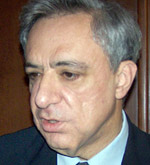– Mr Oskanyan, do you think that the principles of Madrid are first of all acceptable by Karabakh and Armenia or Azerbaijan? And generally what do you think about it?
– When it comes to discussions on the issue of Karabakh the opinions of the society divide in two parts. For a part of them any compromises are unacceptable. Such people are against any document resulted from negotiations with Azerbaijan. In such case we should understand that we don’t need to negotiate at all and realize the price that we are ready to pay for it. On the other hand, if it is about reaching an agreement as a result of negotiations, any documents resulted from the negotiations should be discussed in two contexts: in the context of the principles and the content. For instance, if the principles write that the people of Karabakh have a right for self-determination, it is an acceptable principle. However it is another issue how these principles will be interpreted in the final document. Or, if it writes that the surrounding territories of Karabakh are to be returned, from first look it is acceptable, however if as a result of negotiations we succeed in giving those lands only after the people of Karabakh realize their right for self-determination, and partially, it will look otherwise because these lands have strategic importance for us. In other words, principles are important but the details are essential. During my tenure we failed to come to an agreement over the details. There was a limit for our national interests and we did not cross this limit.
– Do you think that the talks are more beneficial for Armenia now compared to the past years or no? Please refer to concrete facts or examples.
– I can’t say what the “new” document looks like now but I can say concerning the document I know that the fact that the principle in the ground of that document was the right of the Karabakhi people for self-determination, which is very important. However, I think nothing is agreed since everything is not agreed yet. Thus the future of this document depends on the Armenian foreign policy and how the Armenian government may drive the future negotiations and talks.
– Don’t you think that the fact that instead of using the terms “deployment of the Armenian armed forces from the liberated territories” and “land border” the OSCE Minsk Group is using the terms “return the territories surrounding Karabakh under the control of Azerbaijan” and “land connection” is not a failure in our foreign policy? And generally, do you think that the interests of the co-chair countries more fit with the Armenian interests or the interests of Azerbaijan?
– The co-chairs are trying to agree the approaches of the parties and the most important thing for them is not the way of solving the problem but the fact of doing so. Certainly from time to time the co-chairmen make announcements which arise discontent of the parties. However we should be concerned of not letting the co-chairmen to tend to solve the problem in a short period to “support” solution of other problems. In such situation other factors may work too. One of such reasons, as I have numerously said, can be the attempts of Turkey to misuse the initiative to develop Armenian-Turkish relations.
– What do you think about the opinion that the current unfavorable situation of Karabakh conflict is a result of the policy implemented by former president Kocharyan and you?
– Every government is responsible for its tenure and the agreements they sign. During the past ten years we have succeeded in transforming from the Lisbon principles enabling Karabakh to have sovereignty within Azerbaijan to adoption of the right of self-determination. By the way, in this period there was no compromise in terms of Karabakh issue and due to the permanent contact with Armenia the surrounding territories and Karabakh even developed. However every government has an opportunity to give up or reject the heritage of the previous government. It is a historical opportunity. This opportunity was used in 98. Thus the situation of now is in the hands of the incumbent government. The situation should be assessed not only based on the content of documents but the situation resulted from the foreign policy.
– Do you think Karabakh should become a party to the process of negotiations? If yes, why? If yes, why was not it done during Kocharyan’s office?
– Karabakh’s participation in the negotiations was ceased since March 1997 when the negotiations of the MG stopped. However Karabakh is not out of the negotiations. Usually when the co-chairmen came to the region, Armenia, they visited Karabakh as well. In consideration of the fact that the problem cannot be solved without the agreement of the Karabakhi authorities and people, it is very important that Karabakh participates in the process directly as well. In 98 when Armenia was faced with the task whether to continue the negotiations with the former format at the level of ministers and presidents or no, it made a decision to continue the talks. Again, any new government may be faced with such task and make such decision.

